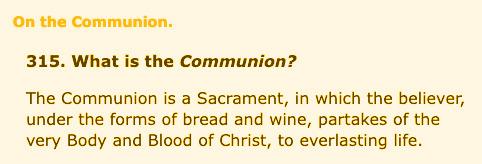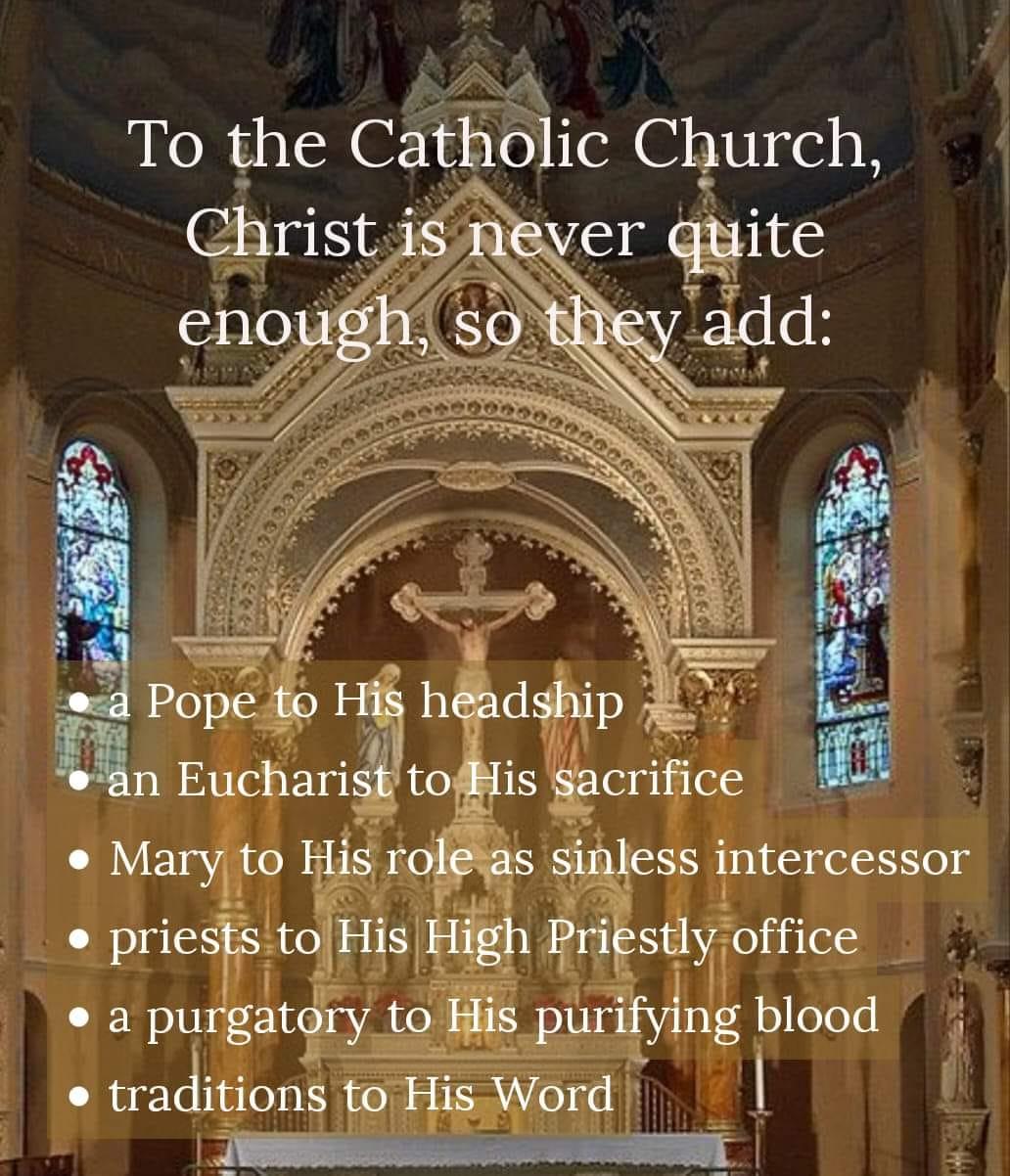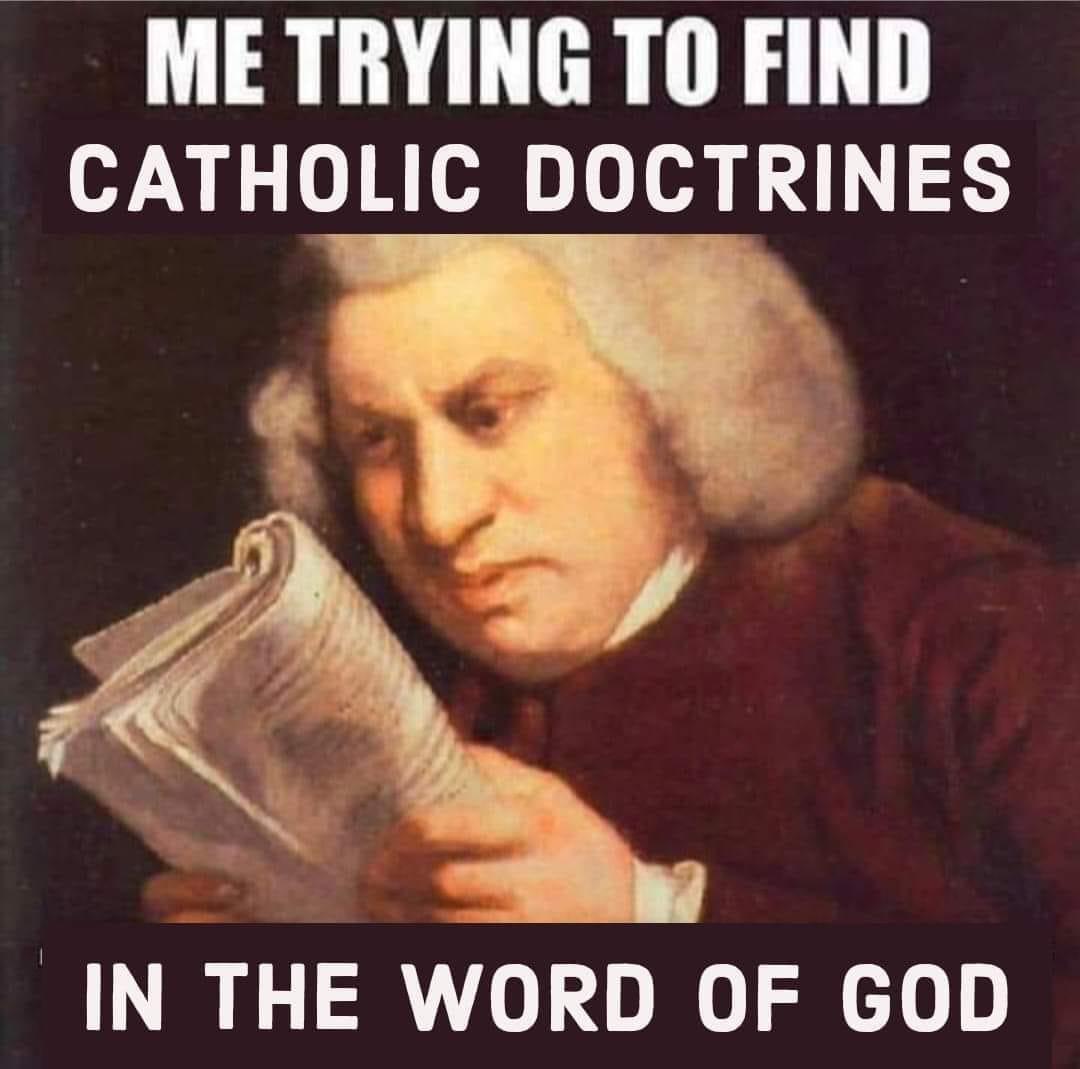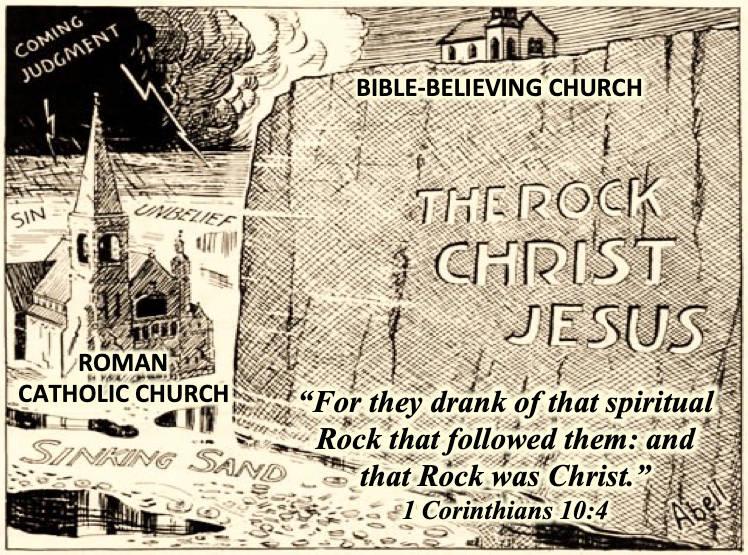Is A Catholic Christian An Oxymoron?
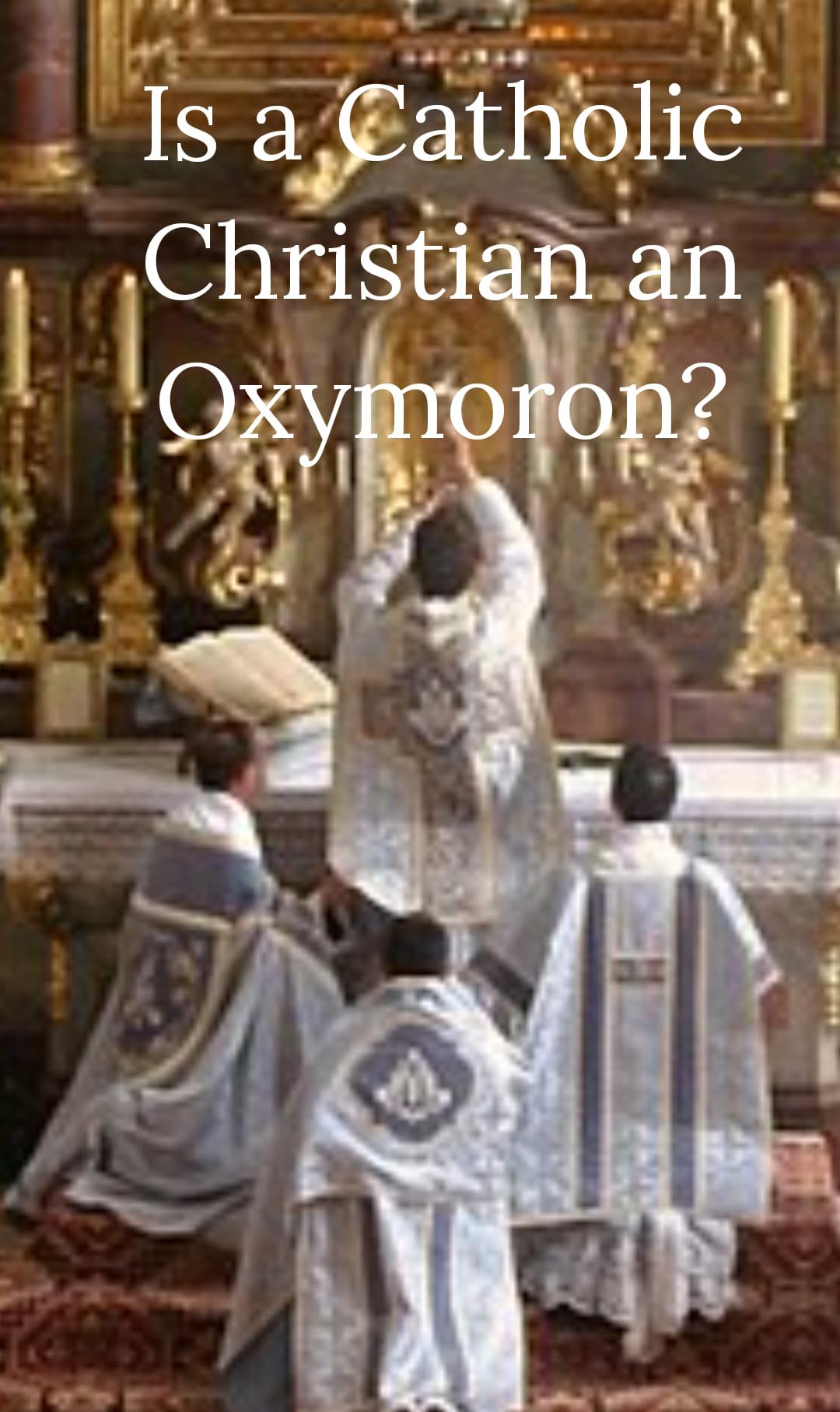
Introduction:
Webster’s dictionary defines an oxymoron as “a combination of contradictory words,” such as jumbo shrimp, tight slacks and pretty ugly. Would you put “Catholic Christian” into this category? Some would say “no”, because they believe Roman Catholicism is a Christian denomination. Others, who know that the official teachings of the Catholic Church contradict the essentials of the Gospel would say “yes.” We propose that a Catholic Christian is indeed an oxymoron for two reasons:
1) Whom we are is what we believe, and
2) It is impossible for anyone to believe two opposing views simultaneously.
We recognize that there may be some Christians attending the Catholic Church but if they have believed the Gospel they are no longer Catholics. Let us consider the contradictory beliefs of Catholics and Christians. By definition we will propose a Christian is one who believes the Gospel while a Catholic is one who believes the official teachings and traditions of his church (presented below, by paragraph numbers from the Catechism of the Catholic Church).
Authority:
● A Christian believes Scripture has authority over church… “All scripture is given by inspiration of God, and is profitable for doctrine, for reproof, for correction, for instruction in righteousness” (2 Tim. 3:16). “by manifestation of the truth commending ourselves to every man’s conscience in the sight of God.” (2 Cor. 4:2).
● A Catholic believes the Church has authority over Scriptures. The manner of interpreting Scripture is ultimately subject to the judgment of the Church which exercises the divinely conferred commission and ministry of watching over and interpreting the Word of God (CCC 119).
Justification:
● A Christian is justified once by faith because justification is a permanent declaration by God… “whom he did predestinate, them he also called: and whom he called, them he also justified: and whom he justified, them he also glorified.” (Romans 8:30). “But to him that worketh not, but believeth on him that justifieth the ungodly, his faith is counted for righteousness.” (Romans 4:5).
● A Catholic is justified repeatedly by sacraments and works because he loses the grace of justification each time a mortal sin is committed. The sacrament of Penance offers a new possibility to convert and to recover the grace of justification (CCC 1446).
Regeneration:
● A Christian believes he is regenerated at baptism of the Spirit. “For by one Spirit are we all baptized into one body, whether we be Jews or Gentiles, whether we be bond or free; and have been all made to drink into one Spirit.” (1 Cor. 12:13). “God hath from the beginning chosen you to salvation through sanctification of the Spirit and belief of the truth:” (2 Thes. 2:13).
● A Catholic believes baptism of water imparts divine life, the water of Baptism truly signifies our birth into the divine life (CCC 694).
Salvation:
● A Christian is saved by God’s unmerited grace. “For by grace are ye saved through faith; and that not of yourselves: it is the gift of God: Not of works, lest any man should boast.” (Eph. 2:8-9).
● A Catholic is saved by meriting the graces needed for salvation. We can merit for ourselves and for others the graces needed for the attainment of eternal life (CCC 2010).
● A Christian is saved FOR good works. “For we are his workmanship, created in Christ Jesus unto good works, which God hath before ordained that we should walk in them.” (Eph. 2:10).
● A Catholic is saved BY good works. The sacraments of the New Covenant are necessary for salvation (CCC 1129).
● A Christian is saved for all eternity. “In whom ye also trusted, after that ye heard the word of truth, the gospel of your salvation: in whom also after that ye believed, ye were sealed with that holy Spirit of promise, Which is the earnest of our inheritance until the redemption of the purchased possession, unto the praise of his glory.” (Eph. 1:13-14).
● A Catholic is saved until a mortal sin is committed. Those who die in a state of mortal sin descend into hell (CCC 1035).
● A Christian believes salvation is offered to those outside the church. “Now then we are ambassadors for Christ, as though God did beseech you by us: we pray you in Christ’s stead, be ye reconciled to God.” (2 Cor. 5:20).
● A Catholic believes salvation is offered through the Church. Basing itself on Scripture and Tradition, the Council teaches that the Church, a pilgrim now on earth, is necessary for salvation. Anyone refusing to enter it or remain in it cannot be saved (CCC 846).
● A Christian is purified by the blood of Jesus. “the blood of Jesus Christ his Son cleanseth us from all sin.” (1 John 1:7).
● A Catholic is purified by the fires of Purgatory. They undergo purification in Purgatory, so as to achieve the holiness necessary to enter the joy of heaven (CCC 1030-31).
Saints:
● A Christian becomes a saint when the Spirit baptizes him into the body of Christ. “And he gave some, apostles; and some, prophets; and some, evangelists; and some, pastors and teachers; For the perfecting of the saints, for the work of the ministry, for the edifying of the body of Christ:” (Eph. 4:11-12).
● A Catholic becomes a saint only if the Pope canonizes them. This occurs when he solemnly proclaims that they practiced a heroic virtue and lived in fidelity to God’s grace (CCC 828).
Priests:
● A Christian is a priest. “But ye are a chosen generation, a royal priesthood, an holy nation, a peculiar people; that ye should shew forth the praises of him who hath called you out of darkness into his marvellous light;” (1 Peter 2:9).
● A Catholic needs a priest. Catholic priests are said to be apostolic successors and guarantee that Christ is acting in the sacraments to dispense divine life (CCC 1120-1131).
The Lord’s Supper:
● A Christian believes the Lord’s Supper is a memorial. “And when he had given thanks, he brake it, and said, Take, eat: this is my body, which is broken for you: this do in remembrance of me. After the same manner also he took the cup, when he had supped, saying, this cup is the new testament in my blood: this do ye, as oft as ye drink it, in remembrance of me.” (1 Cor. 11:24-25).
● A Catholic believes the Lord’s Supper is sacrifice. The sacrifice of Christ and the sacrifice of the Eucharist are one single sacrifice…the same Christ who offered Himself once in a bloody manner on the altar of the cross is contained and offered in an unbloody manner (CCC 1367).
Receiving Christ:
● A Christian receives Jesus once, spiritually, in the heart. “But as many as received him, to them gave he power to become the sons of God, even to them that believe on his name” (John 1:12). “Who hath also sealed us, and given the earnest of the Spirit in our hearts.” (2 Cor. 1:22).
● A Catholic believes he receives Jesus physically, frequently, in the stomach. The body, blood, soul and divinity of our Lord Jesus Christ…is truly, really and substantially contained in the Eucharist (CCC 1374-78).
Condemnation:
● A Christian is condemned by the Roman Catholic Church. Over 100 anathema’s have been pronounced against Christians by the Roman Catholic Councils of Trent and Vatican II. These condemnations are still in effect today and can only be lifted if a Christian returns in submission to the authority of the pope.
● A Catholic is condemned by the Word of God…
“He that rejecteth me, and receiveth not my words, hath one that judgeth him: the word that I have spoken, the same shall judge him in the last day.” (John 12:48).
“I marvel that ye are so soon removed from him that called you into the grace of Christ unto another gospel: Which is not another; but there be some that trouble you, and would pervert the gospel of Christ. But though we, or an angel from heaven, preach any other gospel unto you than that which we have preached unto you, let him be accursed. As we said before, so say I now again, if any man preach any other gospel unto you than that ye have received, let him be accursed.” (Gal. 1:6-9).
Summary:
These teachings and traditions of Roman Catholicism demonstrate that a Catholic Christian is indeed an oxymoron. They also affirm how man made traditions nullify the Word of God as spoken of by the Lord Jesus Christ in Mark chapter 7:
“7 Howbeit in vain do they worship me, teaching for doctrines the commandments of men. 8 For laying aside the commandment of God, ye hold the tradition of men … 9 And he said unto them, Full well ye reject the commandment of God, that ye may keep your own tradition. … 13 Making the word of God of none effect through your tradition, which ye have delivered: and many such like things do ye.” (Mark 7:7-9,13)
There are many Evangelicals and Roman Catholics who are unaware of how diametrically opposed Catholic dogmas are to the Word of God. The truth must be told. Catholics who believe they are Christians must be lovingly confronted with the truth. Evangelicals must be educated so they can proclaim the true gospel to Catholics instead of uniting with them under a compromised and diluted gospel.
God’s truth coupled with Satan’s lies always produces an oxymoron. Yet the “father of lies” continues to seduce many by mixing a little error with truth. In the final analysis, truth mixed with error never hurts the error, it only contaminates the truth. The veneer of truth covering the false gospel of Rome is deceiving not only Catholics but many Protestants as well. Let us persuade Catholics to turn from the errors of man’s teachings to the truth of God’s Word!
God defines truth with His Word… “Sanctify them through thy truth: thy word is truth.” (John 17:17). It is objective, authoritative and sufficient! We must use it to expose the evil deeds of darkness, to set captives free from the bondage of deception and to protect God’s children from being deceived. — by Dan Messimer
